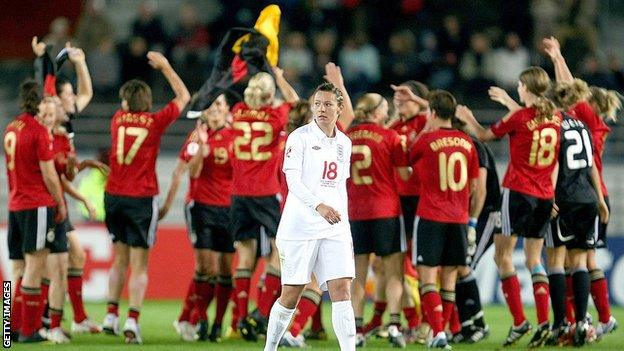Euro 2022: England-Germany rivalry adds another chapter
- Published

Bobby Moore [left] lifted the 1966 World Cup for England after they beat West Germany in the final, while Millie Bright (right) scored in the Lionesses' first win over Germany on home soil in February
In English football history, there is no greater rival than Germany - so it is only fitting that the two teams should go head-to-head in Sunday's Euro 2022 showdown.
The fairytale ending to England's summer is a possibility but they must do what no other women's team has done before - beat Germany in a European final.
And for England, Germany are not just any team.
They are a nation whose football history is entwined with England's. They have haunted the men since Bobby Moore's side won the World Cup in 1966, while their domination of women's football has struck fear into the Lionesses.
In fact, the women's 'rivalry' with Germany could hardly be called that, because of its one-sided nature.
But Sarina Wiegman's side now have a chance to redress the balance somewhat, 13 years after Germany beat England in their last Euro final.

(From left to right) Casey Stoney, Kelly Smith and Karen Carney all played in the 2009 final defeat by Germany
To say meetings with Germany have not gone well is an understatement.
They have beaten the Lionesses in 21 of their 27 matches, with England only winning twice and suffering more defeats at the hands of the Germans than any other nation.
The painful 6-2 defeat in 2009 left England's players in tears on the pitch in Helsinki as it marked a 19-game losing streak against their rivals.
Commentator and presenter Jacqui Oatley, in a blog she wrote for BBC Sport at the time, noted: "I'm surrounded by the familiar sound of raucous, jubilant Germans. We've been here before."
Germany's dominance of European football has lasted for decades. The eight-time champions have only failed to reach the final twice in the tournaments they have competed in. The fourth place finish in 1993 remains their worst.
To understand why there has been a gulf between Germany and England for so long, you need to go back decades.
Women in England were effectively banned from playing football for 50 years between 1921 and 1971, while Germany embraced it.
A successful youth system, a growing professionalism and trained coaches were appearing in Germany while their domestic league was established.
By the time England fully arrived on the world stage, Germany's foundations for success had long been in place.

England have lost both of their Women's Euro finals to Sweden in 1984 and Germany in 2009
But things are starting to change - for both the men's and women's sides.
Last year, England's men ended a 55-year wait for a knockout tie victory over Germany to reach the Euro 2020 quarter-finals.
In February, England's women beat Germany on home soil for the first time to win the Arnold Clark Cup.
England's 14 goals in the group stages of Euro 2022 also set a new record, overtaking Germany's total of 11 from 2001.
So when the two teams meet again in a major tournament final for the first time since 2009, will England still fear Germany as they once did?
"The gulf between England and Germany back [in 2009] was massive. We were part-time, they were professional and ruthless," ex-England defender Alex Scott said on BBC One after the semi-final win over Sweden.
"We have seen the game evolve on the continent since then. Teams have caught Germany up and are not afraid. There is a different feeling facing them."

England manager Gareth Southgate missed the decisive penalty in the 1996 shootout defeat to Germany
Penalties.
The mere thought of a penalty shootout is enough to send shivers down the spine of any England fan. Add Germany into the mix and it's the stuff of nightmares.
Their men's team have won six of the seven shootouts they have had in major tournaments and two of those were against England - in 1990 and 1996.
Meanwhile, the only previous final in the Women's Euros to go to a penalty shootout was in 1984 when, you guessed it, England lost.
But are England better prepared this time around?
"I'm not giving away any training secrets but we have been doing our work," said England captain Leah Williamson earlier this month.

Germany striker Alexandra Popp is joint-top scorer at Euro 2022 alongside England's Beth Mead
At Euro 2022, both teams topped their group, winning all three games without conceding a goal.
England's Beth Mead and Germany's Alexandra Popp lead the goalscoring charts with six goals apiece.
And despite England being the bookies' favourites to win the competition on home soil, Martina Voss-Tecklenburg's side have impressed.
"They have been in transition for a few years now but they seem to be the Germany of old," said former England midfielder Fara Williams.
"They came into the tournament as an unknown but now we know who they are."

England lost in a friendly to Germany at Wembley in 2019 as the women set a new home crowd record
Whatever happens, it will be a final to remember.
Tickets for Sunday's showdown at Wembley, which has a capacity of 87,200, have sold out.
It could be the most attended Euros game ever for men or women.
It would also break the current record for a Lionesses' home international when 77,768 watched England at Wembley lose a friendly to... yes, you guessed it, Germany.
So as the teams prepare for Sunday's final, England fans can't help but feel a sense of nostalgia, dread - and also, this time, hope.
Were the Lionesses to become the team to finally inflict defeat on Germany in the final of a European Women's Championship, and in the process win their first major tournament, it would be the most romantic of endings to their fairytale.